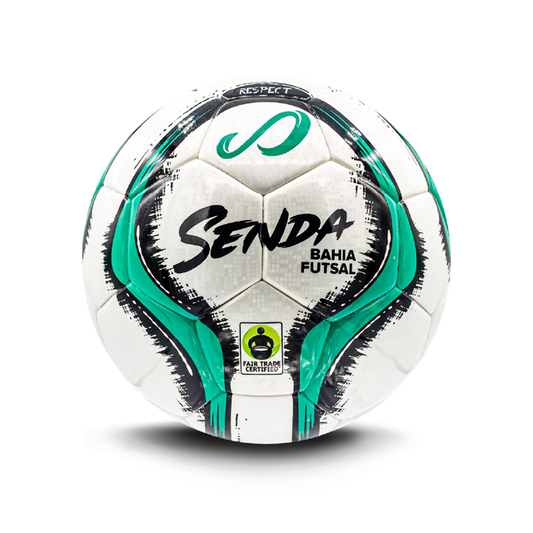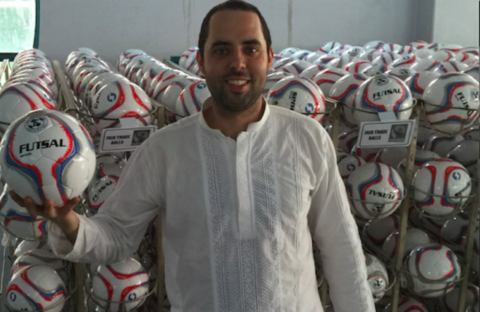My second trip to meet Senda’s Fair Trade ball producers last March in Sialkot, Pakistan was even more inspiring, productive and hopeful than my first one in 2012. This time around Senda is able to have a bigger impact on the ground due to larger sales. I also felt that I had a better understanding of the culture, the food, and even the clothes. I arrived wearing traditional white Kurta attire, much to the surprise of my hosts at the factory, who could not help smiling when they saw me. It proved to be the perfect outfit for many of my days inside and outside the factory.

Here I am inspecting production of the new US Youth Futsal Match ball, wearing the traditional Kurta attire
A big part of the trip was about ensuring that Senda maintains our high-quality standards and craftsmanship levels as our sales quickly increase thanks to the support of our customers and our retail partners like Amazon, Soccer.com, Target, Soccer Savings, Soccer Garage. They have helped us to share Senda’s story, and have made a commitment to Fair Trade and to sourcing high-quality products from an up-and-coming, yet non-mainstream brand.

I was very satisfied to see 7 different quality control checks along the ball production line, starting with the inspection of the raw materials in the very beginning, continuing along with the insertion of the bladder and the stitching, and finishing with the washing and packing of the product.

A Senda ball maker runs a Quality Control check on the balls outer material before cutting it
Our producers are committed to craftsmanship and quality. They also know first-hand the importance of promoting the Fair Trade movement. Many producers shared that their desire to see more Fair Trade certified orders inspires them to pay extra attention to their work when making Senda’s balls.

One of the highlights of the journey was meeting Mr. Shakir Hussein, the new Fair Trade Liaison in Pakistan. He will now help and train the Fair Trade Community projects to perform risk assessments with their proposed new projects. Mr Shakir has experience with the UNDP, and is looking forward to leveraging the funds from the Fair Trade premium to make a difference for workers on the ground.

Visiting the family of one of our Fair Trade ball producers
During my visit, I was able to participate in a special event at the factory related to Fair Trade: the delivery of backpacks and school supplies to the ball makers’ children ahead of the beginning of the new school year in April. The expenses associated with the beginning of the school year can be high for ball makers’ families, especially when some of them have 3 or more school aged children. This School Backpack and supplies project has been very popular with Fair Trade premium committees, and we look forward to seeing the impact it has on young children staying in school longer, and learning more with the right supplies.

Delivering school bags to children was one of the most inspiring and satisfying parts of the trip
Another impactful Fair Trade project is the water purification plant that was built outside of the factory producing our premium quality soccer balls. This plant is open not only to factory workers, but to everyone in the community! During my brief visit to the water plant, which cleans the water by reverse osmosis, I saw dozens of peoples carrying clean water by bicycle, on motorcycles and in cars. Every day there are hundreds of families that benefit from this Fair Trade project, and during the summer months the demand grows even more. The next phase of this “Access to Clean Water” project is to facilitate the delivery to the workers’ homes in buses, and the Fair Trade Premium committee hopes to start a pilot in 2017! I had the chance to try the water, and it tastes really good.

I enjoyed trying the water from the purification plans funded by the Fair Trade Premium committee
As it was with my last trip, playing soccer with the ball makers was an important aspect of the trip that helped me to integrate into their community. It seems to be something that matters to them as well: during the 3 games played we had over 400 spectators watching their co-workers play with the same Fair Trade balls they make . The day after the match, I could feel that the ball makers were more familiar with me, shared a smile in a factory corridor, or talked to me about the match during their breaks (“Good game, well played!”). Even after years connecting with people over a match around the world, I continue to be amazed and inspired by the unifying power of a soccer ball!

Playing a total of three Soccer with Senda’s ball makers was an ideal way to get to know them
Finally, I visited the Lahore School of Economics to discuss their possible academic involvement in studying the effects of Fair Trade on local communities. The LSE is one of the top universities in the country, and their involvement to help study the impact of Fair Trade would be very beneficial!

On my last day in Lahore, I had the pleasure of visiting the Lahore School of Economics to discuss the academic study of the impact of Fair Trade
It is hard to believe everything we were able to accomplish in 2 weeks. While we have heard that most brands prefer to do quick visits with suppliers to negotiate pricing and briefly discuss their new product lines, for Senda it is important to connect with our ball makers at a deeper and more direct level. We believe that it is not only a more humane way of doing business but also that this deeper connection helps Senda produce a better product that spreads the joy of soccer to the world!


